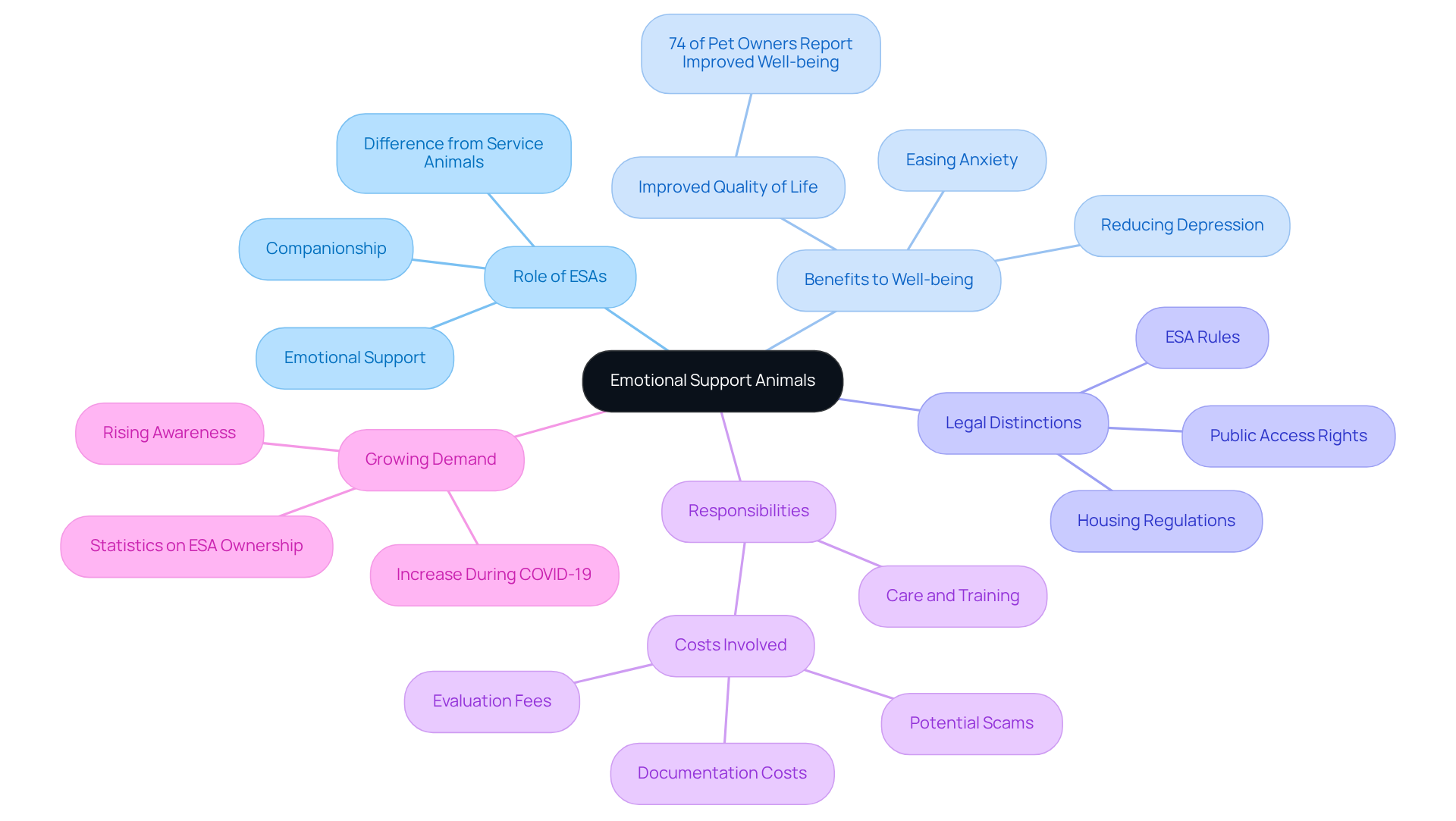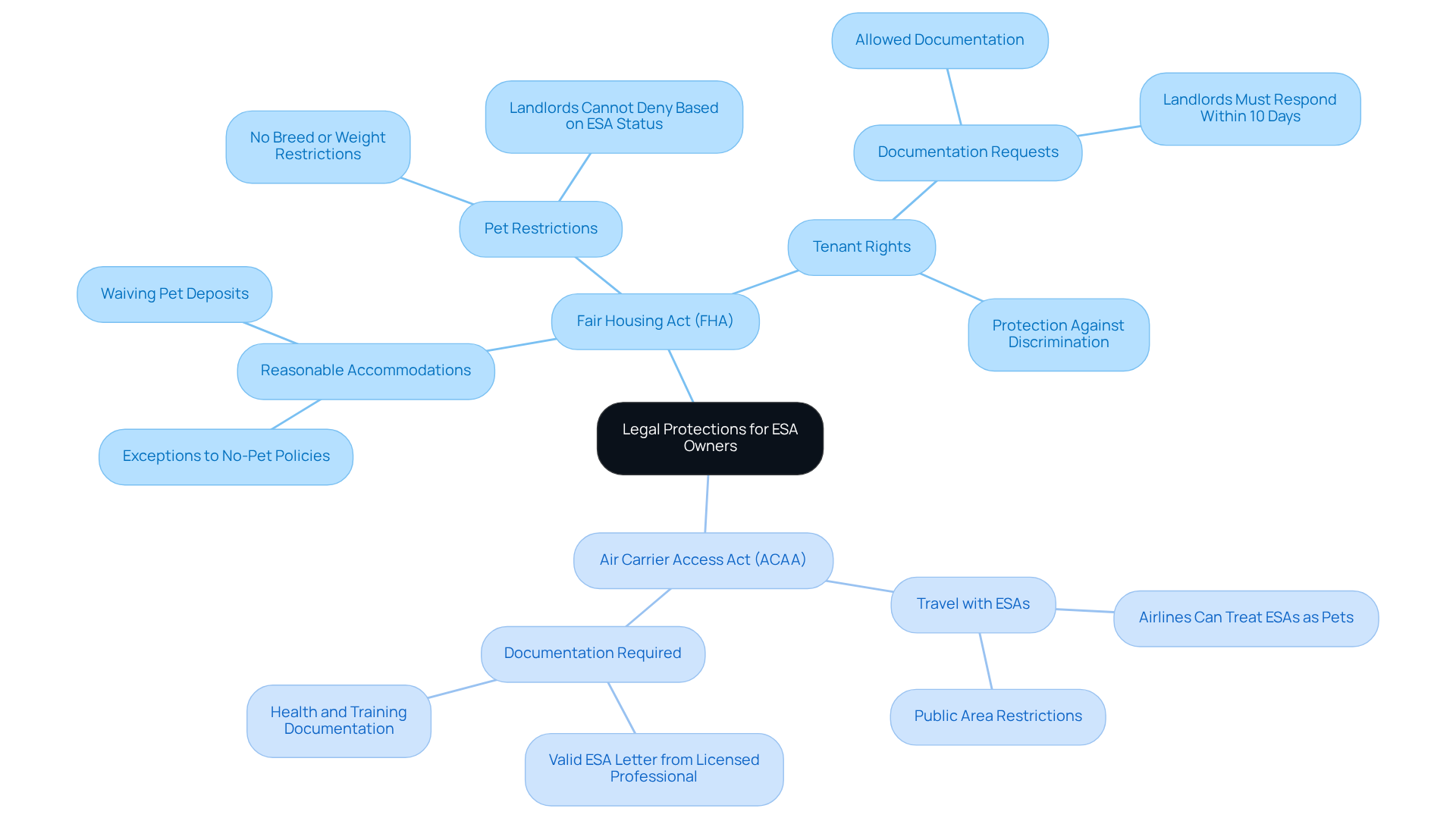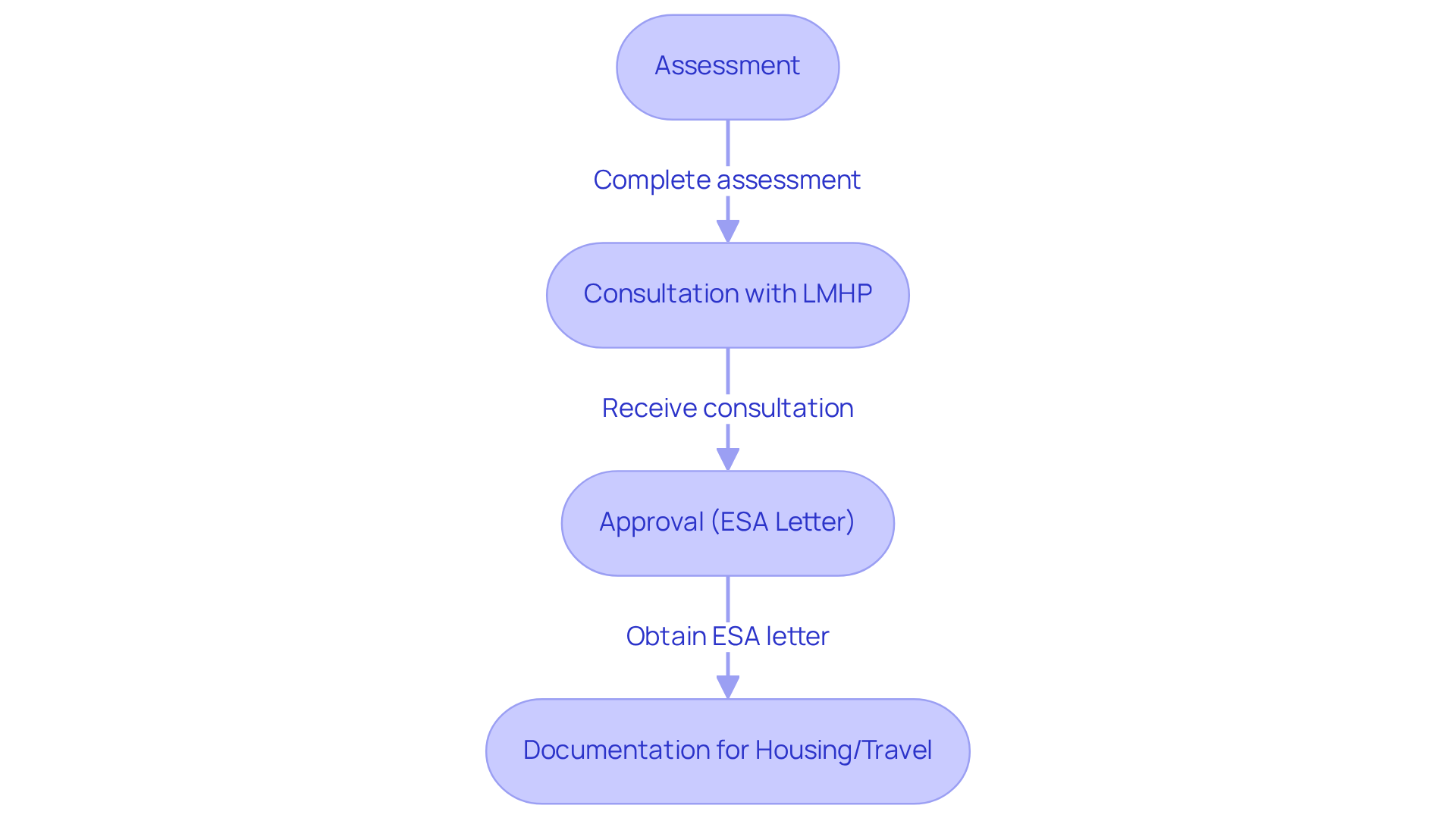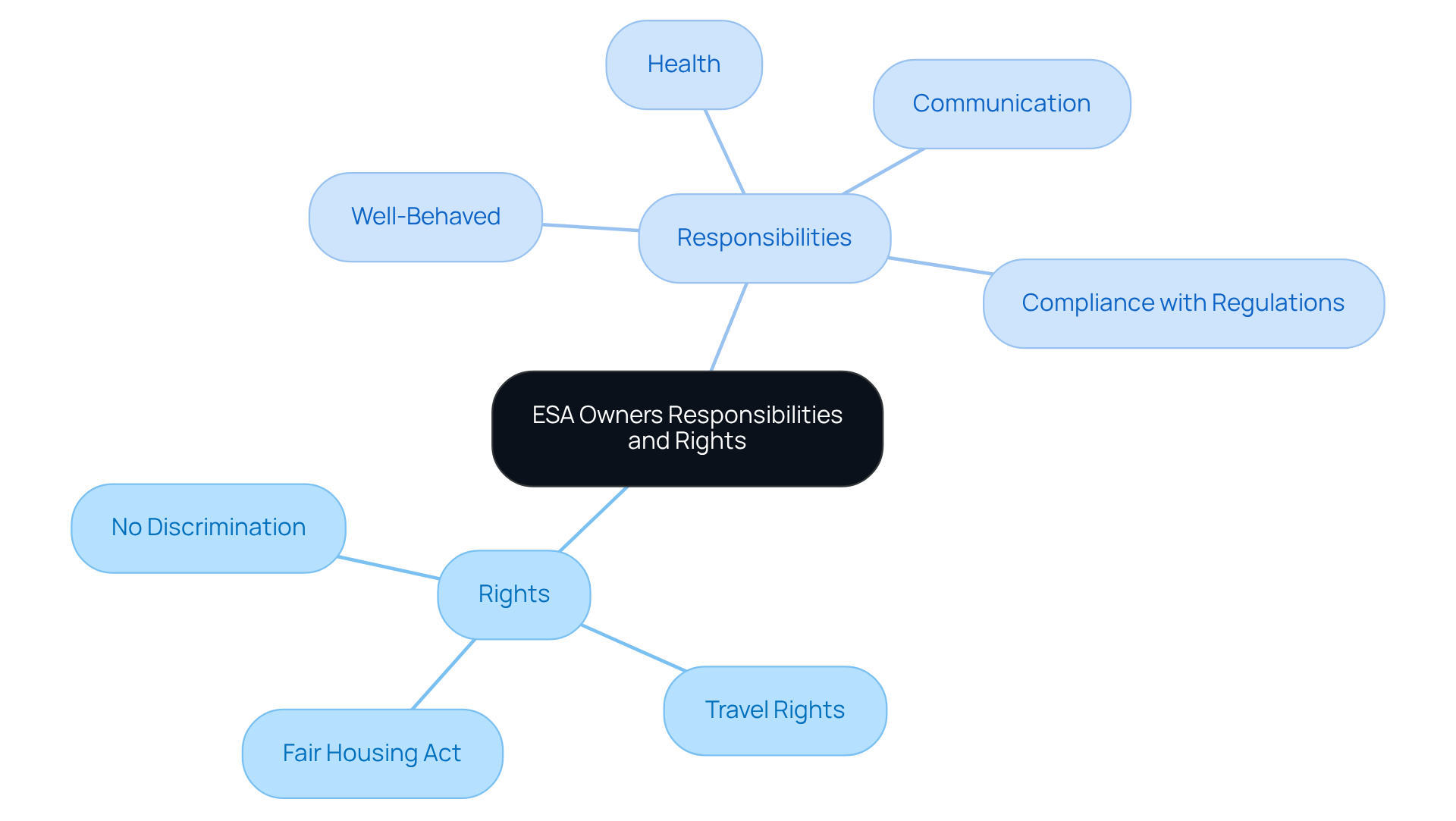

Master ESA Rules: Your Guide to Emotional Support Animals
by Lena Park
Last updated: September 11, 2025
Verified and Approved by:
Angela Morris,
MSW, LCSW
Fact Checked

Overview
Emotional Support Animals (ESAs) offer vital companionship to those navigating emotional or psychological challenges. Unlike service animals, which provide specialized assistance, ESAs primarily focus on delivering emotional support. It’s essential to grasp the rules surrounding ESAs, including the legal protections provided by the Fair Housing Act and the Air Carrier Access Act. Additionally, understanding the responsibilities of ESA owners is crucial, as it helps ensure a smooth experience when navigating housing and travel with their beloved companions.
Many individuals face significant emotional struggles that can feel isolating and overwhelming. The presence of an ESA can make a profound difference, providing comfort and companionship during difficult times. An ESA letter can serve as a supportive solution, validating the bond between the individual and their animal, and helping them access the necessary accommodations.
As you reflect on your own experiences, consider how an ESA could enhance your emotional well-being. The journey toward healing can be daunting, but the support available through ESAs is both real and impactful. Remember, you are not alone in this journey, and there are resources to help you navigate the challenges you face. Together, we can foster understanding and compassion for those in need of emotional support.
Introduction
Emotional Support Animals (ESAs) have become essential companions for individuals navigating emotional and psychological challenges, offering comfort and stability during difficult times. As our understanding of mental health progresses, we increasingly recognize the profound role these animals play in enhancing well-being. Yet, with the rising demand for ESAs comes a complex web of regulations and responsibilities that can feel overwhelming for those considering this path. How can individuals effectively navigate the intricacies of ESA laws while ensuring they are fully informed about their rights and obligations?
For many, the journey through emotional struggles can be isolating and daunting. The presence of an ESA can provide not just companionship but also a sense of purpose and stability. These animals can help alleviate feelings of anxiety and depression, reminding us that we are not alone in our battles. By understanding the benefits that ESAs offer, individuals can find renewed hope and support in their daily lives.
As we explore the support available through ESA letters, it’s important to acknowledge the emotional weight these challenges carry. Know that you are not alone, and there are resources to guide you through this process. Embracing the companionship of an ESA can be a transformative step towards healing and well-being, allowing you to reclaim joy and connection in your life.
Define Emotional Support Animals and Their Role
Emotional Support Animals (ESAs) play a crucial role as companions for those navigating emotional or psychological challenges. They differ from service animals, which are specially trained to assist individuals with disabilities; ESAs primarily offer companionship and emotional support. The mere presence of an ESA can significantly ease symptoms associated with anxiety, depression, PTSD, and other psychological conditions.
Research shows that the companionship of an ESA can enhance emotional well-being, providing a sense of security and alleviating feelings of isolation. In fact, nearly 74% of pet owners report an improvement in their well-being after welcoming a pet into their lives, highlighting the profound impact that pet companionship can have.
While ESAs do not require specialized training like service animals, they should be well-behaved and under control in public spaces. Understanding the ESA rules and the distinction between ESAs and service animals is vital for those seeking to benefit from ESAs, especially concerning housing and travel requirements related to their emotional needs.
As outlined in our FAQs, the ESA rules state that ESAs provide emotional comfort but do not have the same legal rights and public access as service dogs under the ADA. It’s also important to consider the responsibilities that come with obtaining an ESA, such as potential costs for evaluations and documentation, and to remain vigilant against scams that may target ESA registration.
The growing demand for ESAs, particularly during challenging times like the COVID-19 pandemic, underscores the importance of recognizing their role in enhancing well-being. For those in California, obtaining an ESA letter can be facilitated through Wellness Wag’s user-friendly online platform, ensuring adherence to state-specific regulations. Additionally, understanding the Fair Housing Act and air travel regulations is crucial for individuals looking to travel or secure housing with their ESAs.

Explore Legal Protections for ESA Owners
Emotional Support Animal (ESA) owners benefit from specific legal protections that significantly enhance their ability to live and travel alongside their beloved companions. The Fair Housing Act (FHA) is designed to ensure that housing providers make reasonable accommodations for individuals with ESAs, even in properties that have pet restrictions. This means that landlords cannot deny housing solely based on a tenant’s ESA status. For example, there have been successful accommodation requests made by tenants in pet-restricted housing, showcasing the FHA’s commitment to providing equal access for individuals with disabilities.
Similarly, the Air Carrier Access Act (ACAA) allows individuals to travel with their ESAs on airlines, provided they have the necessary documentation, such as a valid ESA letter from a licensed psychological professional. However, it’s crucial for ESA owners to recognize that these legal protections do not extend to all public areas; businesses have the right to establish their own policies regarding pets.
Understanding the ESA rules and these legal frameworks is vital for effectively advocating for the rights associated with having an ESA, especially considering recent updates to the FHA that clarify landlords’ responsibilities and tenants’ rights. Familiarity with these laws empowers ESA owners to navigate housing and travel challenges with confidence, knowing they have support every step of the way.

Outline the Process for Obtaining an ESA Letter
Obtaining an ESA letter can be a vital step towards emotional well-being, and it involves several essential steps that support your journey:
-
First, an Assessment is necessary. This brief evaluation helps determine your eligibility for an Emotional Support Animal (ESA). It typically includes questions about your psychological well-being and how an animal could positively impact your life.
-
Next, it’s important to Consult with a licensed mental health practitioner (LMHP). This meeting is crucial, as the expert will assess your psychological state and determine if the ESA rules are applicable for you. Many individuals find comfort in knowing that they can expect to receive their ESA letter within 24 to 48 hours after this consultation. However, it’s understandable that the timeframe can vary based on factors such as the provider and state laws, with the average waiting time ranging from 24 hours to a couple of weeks.
-
Once approved, the psychological specialist will provide an Approval in the form of an official ESA letter. This letter must include specific details, like the professional’s license number and a statement confirming your need for an ESA. It’s important to be aware that in some states, such as California, under ESA rules, a provider must have a prior relationship with you for at least 30 days before issuing an ESA letter, which can lead to potential delays. Additionally, Assistance Animals must be fully house-trained and up to date on all vaccinations. They are only allowed within the student’s bedroom in their assigned residence hall and are not permitted in shared spaces such as classrooms or dining areas.
-
Lastly, it’s essential to maintain documentation of your ESA rules letter, as it is necessary for housing and travel accommodations. You may also need to provide medical records during your consultation to facilitate the process.
Statistics show that a significant percentage of individuals receive approval for ESA letters following their consultations, emphasizing the effectiveness of this supportive process. As a professional wisely noted, “Once your therapist or doctor approves you for an emotional support companion, they need to actually write the letter.” By engaging in an open discussion with your mental health professional about your need for an ESA, you can help ensure a smoother approval process. Remember, you are not alone in this journey; support is available to guide you every step of the way.

Clarify Responsibilities and Rights of ESA Owners
As an Emotional Support Animal (ESA) owner, it is essential to understand the ESA rules and your rights and responsibilities to create a harmonious living experience.
Rights:
Under the Fair Housing Act (FHA), you have the right to live with your ESA in housing that typically prohibits pets. This important law requires landlords to make reasonable accommodations for tenants with documented disabilities, allowing you to reside with your ESA rules without facing discrimination or additional pet fees. While airlines have shifted to treating ESAs as pets, you still have the right to travel with your ESA on carriers that accept them, as long as you adhere to their specific guidelines.
Responsibilities:
However, with these rights come significant responsibilities. It is crucial to ensure that your ESA is well-behaved, clean, and healthy, minimizing any disturbances to neighbors or other tenants. This includes addressing behavioral issues and following local regulations regarding animals. Open communication with landlords and service providers is vital; fostering a cooperative relationship can help ease potential conflicts.
Statistics reveal that many ESA owners encounter challenges with landlords or airlines, underscoring the importance of being well-informed. For example, 62% of ESA owners report that their pets significantly alleviate stress and anxiety levels, yet navigating housing and travel regulations can still be complex. By understanding your rights and responsibilities regarding ESA rules, you can effectively advocate for your ESA and cultivate a supportive environment for both you and your beloved animal companion.

Conclusion
Emotional Support Animals (ESAs) are more than just companions; they are vital allies for individuals navigating emotional or psychological challenges. These cherished animals provide comfort and help alleviate feelings of isolation. While ESAs differ from service animals in their training and legal rights, their presence can significantly enhance emotional well-being. Therefore, it is essential for individuals to understand the specific ESA rules and regulations that govern their use in housing and travel.
The article sheds light on crucial aspects such as the legal protections afforded to ESA owners under the Fair Housing Act and the Air Carrier Access Act. These laws ensure that reasonable accommodations are provided in both housing and travel settings. It also outlines the process for obtaining an ESA letter, emphasizing the importance of consulting with licensed mental health professionals and maintaining proper documentation. Moreover, the responsibilities that come with owning an ESA, such as ensuring the animal’s good behavior and compliance with local regulations, are vital for fostering a harmonious living environment.
Recognizing the profound role that ESAs play in mental health, it is imperative for potential ESA owners to stay informed about their rights and responsibilities. How can you ensure that you are fully equipped to navigate this journey? By understanding the legal frameworks and engaging in open communication with landlords and service providers, individuals can successfully navigate the complexities associated with having an ESA. Embracing this knowledge not only empowers ESA owners but also enhances the overall experience of companionship. Ultimately, this understanding contributes to improved emotional well-being, reminding us that support is always available.
Frequently Asked Questions
What are Emotional Support Animals (ESAs)?
Emotional Support Animals (ESAs) are companions that provide emotional support to individuals facing emotional or psychological challenges. Unlike service animals, which are trained to assist individuals with disabilities, ESAs primarily offer companionship and comfort.
How do ESAs help individuals with psychological conditions?
The presence of an ESA can significantly ease symptoms associated with anxiety, depression, PTSD, and other psychological conditions, enhancing emotional well-being and providing a sense of security.
What is the difference between an ESA and a service animal?
The main difference is that service animals are specially trained to assist individuals with disabilities and have specific legal rights under the ADA, while ESAs provide emotional comfort but do not have the same public access rights.
Are ESAs required to have specialized training?
No, ESAs do not require specialized training like service animals, but they should be well-behaved and under control in public spaces.
What are the legal rights of ESAs in terms of housing and travel?
ESAs provide emotional comfort but do not have the same legal rights and public access as service dogs under the ADA. It is important to understand the Fair Housing Act and air travel regulations related to ESAs.
What are the responsibilities associated with obtaining an ESA?
Responsibilities include potential costs for evaluations and documentation, as well as being vigilant against scams targeting ESA registration.
How has the demand for ESAs changed during the COVID-19 pandemic?
There has been a growing demand for ESAs during challenging times like the COVID-19 pandemic, highlighting their importance in enhancing well-being.
How can individuals in California obtain an ESA letter?
Individuals in California can obtain an ESA letter through Wellness Wag’s user-friendly online platform, which ensures adherence to state-specific regulations.
Certify Your Emotional Support Animal Today

Why You Can Rely on Us?
At Wellness Wag, we believe your pet deserves care rooted in both science and compassion. Each article is carefully researched, written in clear language for pet owners, and then reviewed by qualified professionals to ensure the information is evidence-based, current, and practical for real-life care. Our goal is to help you feel confident in making informed decisions about your pet’s health and well-being.
Reviewed by
Angela Morris, MSW, LCSW
Angela is a licensed clinical social worker with 20 years of experience in patient advocacy and community mental health. She has assisted numerous clients with ESA evaluations and brings a deep understanding of disability accommodations, ensuring that all information is accurate, supportive, and practical.

Written by :
Lena Park
Last Updated :
September 11, 2025












